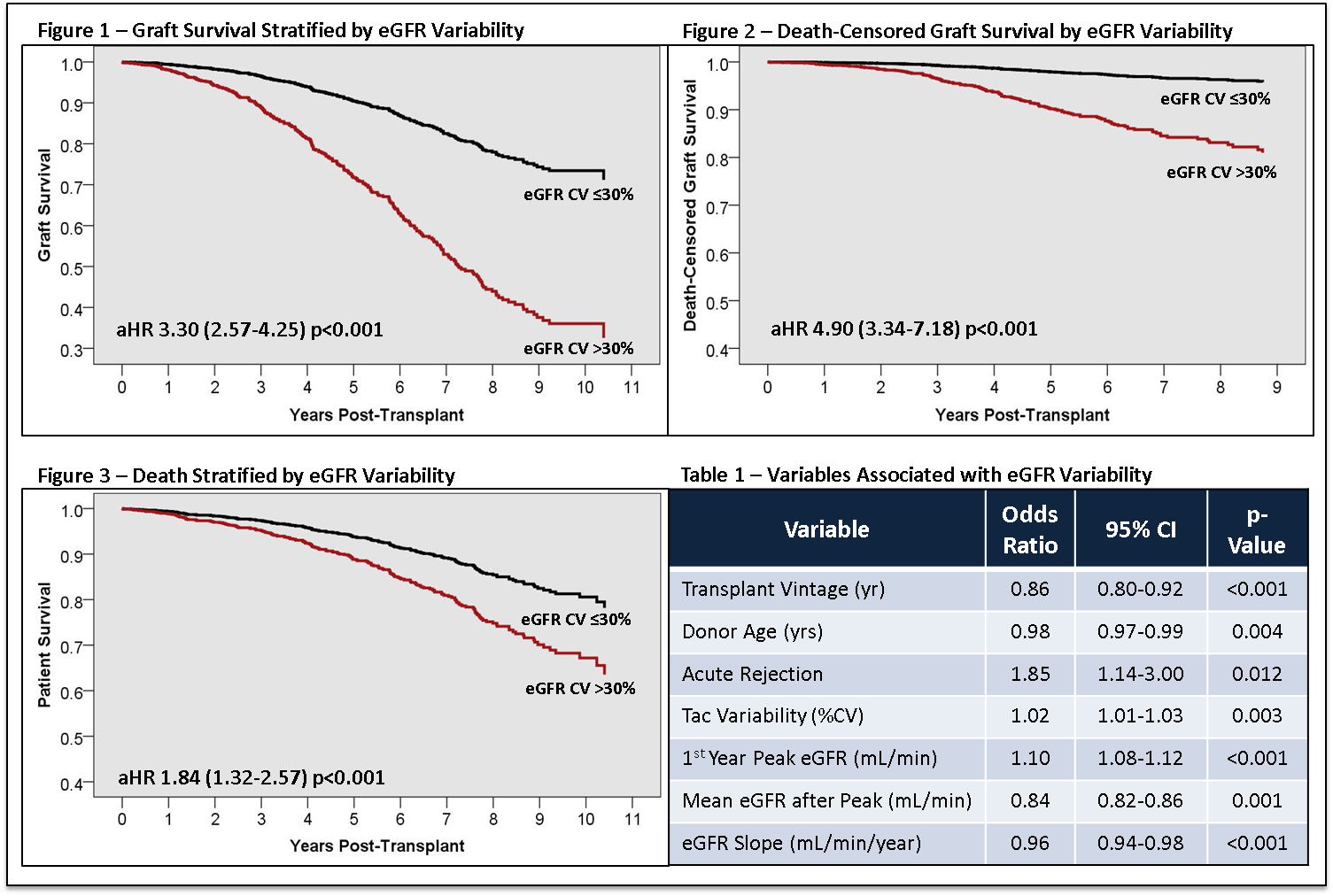Renal Function Variability Is a Significant and Independent Risk Factor for Graft Loss and Death in Kidney Transplantation.
1Transplant, MUSC, Charleston, SC
2Transplant, Intermountain Healthcare, Salt Lake City, UT
Meeting: 2017 American Transplant Congress
Abstract number: D255
Keywords: Graft function, Kidney transplantation
Session Information
Session Name: Poster Session D: Long Term Kidney Outcomes
Session Type: Poster Session
Date: Tuesday, May 2, 2017
Session Time: 6:00pm-7:00pm
 Presentation Time: 6:00pm-7:00pm
Presentation Time: 6:00pm-7:00pm
Location: Hall D1
Previous studies have demonstrated that the magnitude of decline in renal function can predict graft loss after kidney transplant (KTX), but there is limited research assessing the impact of renal function variability on KTX outcomes. We hypothesized that variability in eGFR may provide a clinically measurable surrogate that independently predicts outcomes.
Methods: Single-center, longitudinal cohort study of KTX patients assessing renal function using the 4-variable MDRD (eGFR). Intra-patient renal function variability was assessed using the coefficient of variation (%CV=SD/mean) of the eGFR measured after the first year max eGFR occurred and up until graft loss, death or end of follow-up. Pediatrics and non-renal transplants were excluded. Standard univariate tests and multivariable Cox regression models were used to analyze data.
Results: 1,543 KTX recipients were included with a mean eGFR CV of 21.8±16.7% (range 0-124%) and 314 (20.4%) having and eGFR CV >30%. In fully adjusted models, those with an eGFR CV >30% had 3.30 (2.57-4.25) times higher risk of graft loss, 84% (1.32-2.57) higher risk of death and 4.90 (3.34-7.18) times higher risk of death-censored graft loss (Figures). Variables associated with high eGFR variability included transplant vintage, donor age, acute rejection, tacrolimus variability, 1-year peak eGFR, mean eGFR after peak, and eGFR slope (Table 1). Although mean eGFR (r=-0.453, p<0.001) and eGFR slope (r=-0.397, p<0.001) were strongly correlated with eGFR variability, all eGFR variables independently predicted graft and patient outcomes.
Conclusion: Renal function variability, as estimated using eGFR %CV after the 1st year peak is independently associated with graft loss and death in KTX. This may reflect post-transplant fluctuation in eGFR representing dysautoregulation events cumulatively leading to irreversible graft damage. Variability in eGFR could provide a clinically actionable signal to trigger interventions.
CITATION INFORMATION: Taber D, Su Z, Posadas A, Dubay D, Bratton C, McGillicuddy J, Chavin K, Srinivas T, Nadig S, Rohan V, Baliga P. Renal Function Variability Is a Significant and Independent Risk Factor for Graft Loss and Death in Kidney Transplantation. Am J Transplant. 2017;17 (suppl 3).
To cite this abstract in AMA style:
Taber D, Su Z, Posadas A, Dubay D, Bratton C, McGillicuddy J, Chavin K, Srinivas T, Nadig S, Rohan V, Baliga P. Renal Function Variability Is a Significant and Independent Risk Factor for Graft Loss and Death in Kidney Transplantation. [abstract]. Am J Transplant. 2017; 17 (suppl 3). https://atcmeetingabstracts.com/abstract/renal-function-variability-is-a-significant-and-independent-risk-factor-for-graft-loss-and-death-in-kidney-transplantation/. Accessed February 22, 2026.« Back to 2017 American Transplant Congress
